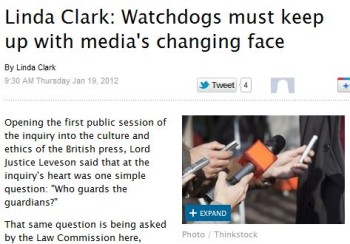
(Credit: New Zealand Herald, screenshot)
Linda Clark, a former political editor for New Zealand TV news outlet, TVNZ, argued that New Zealand’s self-regulatory model is “outdated” in a column for the New Zealand Herald.
Clark was “New Zealand’s leading political journalist” before she left journalism to work as a “strategic and government relations consultant,” according to her firm, Chapman Tripp. She was an “award-winning journalist,” according to Stuff.co.nz.
Clark looked at New Zealand’s media regulatory system – which includes a press council and the Broadcasting Standards Authority – in light of the UK phone hacking scandal and the Leveson Inquiry into press standards. According to Clark’s column, in New Zealand, one must first attempt to resolve any complaints directly with the news outlet and then, if that attempt is unsuccessful, one can have a “right of appeal” to the two regulatory bodies.
Clark argued that “this compartmentalised approach is outdated” because of online publishing by print and broadcast outlets, which creates a “technological and content blur.” Questions raised include who regulates the online content and does the statute of limitations for complaints about content change given online publishing, which keeps stories up indefinitely.
She also questioned how to regulate the “whole world of bloggers and citizen journalists.”
She noted that last month, New Zealand’s Law Commission reviewed the country’s regulatory framework in a December-published paper and proposed a “new single regulator” to address all media complaints. That regulator could also initiate complaints or investigations, whereas under the current system, the regulatory bodies can only act upon complaints.
We wrote to the press council seeking comment about Clark’s column. The council’s Mary Major told iMediaEthics that the council “has no comment to make at this stage” but that it may after it files a submission to the Law Commission about its report in the next two months.
We wrote in December about the New Zealand’s law commission’s proposal for a “super watchdog” here. However, Clark wondered whether the commission’s proposal to separate entertainment and news complaints would work because there is “convergence between the two spheres” when entertainment is featured on news programs, for example.
We asked the Law Commission if it had any response to Clark’s questions. The Law Commission’s Cate Brett told iMediaEthics by e-mail that it “will be addressing this issue in our final report,” scheduling for publication at the end of the year.
We have written to Linda Clark seeking comment and will update with any response.





